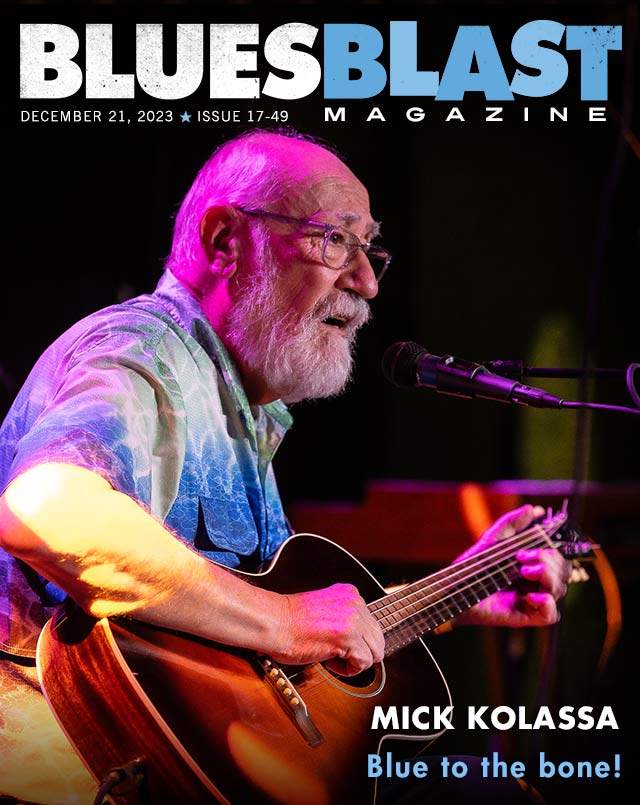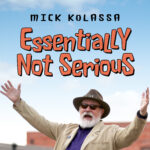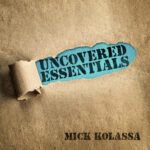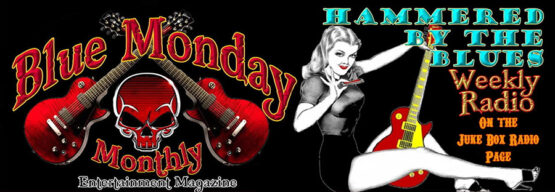- Home
- News
- About
- Music
- For the Feral Heart – CD
- They Call Me Uncle Mick – CD
- I’m Just Getting Started – CD
- If You Can’t Be Good, Be Good At It – CD
- Uncle Mick’s Christmas Album
- Wasted Youth
- Blind Lemon Sessions – CD
- 149 Delta Avenue – CD
- Double Standards – CD
- You Can’t Do That – CD
- Taylor Made Blues – CD
- Ghosts of the Riverside Hotel – CD
- Michissippi Mick – CD
- Promo
- Video
- Events
- Links
CD REVIEWS – All Kinds of Blues
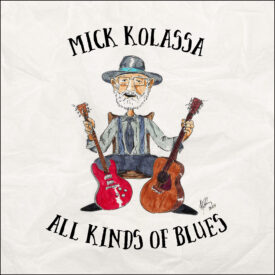
Living Blues
There’s something to be said for truth in advertising, so credit veteran bluesman Mick Kolassa for staying true to the title of his latest opus, All Kinds of Blues. As the name implies, it offers a varied array of formative blues styles that mostly share an old school sound. In the process, Kolassa eschews any hint of pretension and opts instead for an authentic roots regimen.
Despite some shifts in sound, the songs segue nicely from one to another, bringing a sense of continuity overall. With 15 albums to his credit, it’s little surprise that he’s able to not only expand the parameters, but also consolidate his efforts within a single set of songs. His joy and enthusiasm create the common bond throughout, with the buoyant and breezy Amy Iodine and the easy yet ecstatic Does Your Mama Know? being but two prime examples. The sturdy brass that enhances Thank You Memphis, an effusive ode to the place he, until recently, called home, the solid strut that defines Eating My Soul and the easy, breezy shuffles that bolster Where Love Takes Me, Somebody Else’s Whiskey, and Too Old to Die Young find him offering due reverence to tradition even as he effectively asserts his own independence.
With 14 songs in total, there’s also ample opportunity to diverge and diversify. Eating My Soul digs deeply into some darker emotions, while I Can’t Sing No Blues Tonight draws on the sound of an early Delta blues that’s underpinned by acoustic guitar and the steady stride of some persuasive piano. That Don’t Mean and Did You Ever Wonder add some messaging to the music, further affirming Kolassa’s engaging attitude. So too, when he ends the album by sharing a personal perspective, courtesy of the acoustic ramble A Yankee Heading Home, he offers added insight into his essential inspiration and those emotions that brought him into those realms early on. It’s both reflective and revealing, each in equal measure.
Ultimately, All Kinds of Blues provides the perfect compendium to sum up a decidedly creative career. Happily, then, one also gets the impression that there’s plenty more stash left in Kolassa’s cache. ~ Lee Zimmerman, Living Blues – Issue #293
The Rock Doctors Hot Wax
This is Mick’s 15th blues album and it’s just all kinds of excellent. Previous records have included a few sub-genres but for the appropriately titled All Kinds Of Blues his intention was to include as many varieties as he could, resulting in one of his most satisfying discs ever.
All Kinds Of Blues swings as it wanders from genre to genre under the blues umbrella. Kolassa is a good singer and fine player, but his sense of humor as a lyricist is to be noted too. This album includes his first song about AI love in Amy Iodine complete with spacy keyboard noises and the sound of an old dial up modem to get the point across. Too Old To Die Young is about coming to terms with aging, and You Bumped Me Again is a funky number about repeated rejection.
All Kinds Of Blues was smartly produced by Jeff Jensen, displaying Kolassa’s love of the blues in all of its styles. It’s got that swing and some jazzy arrangements here too, with funk and soul thrown in for good measure. I have 12 of his albums, and to my ears this is the best one yet. ~ By John Kereiff Features – Music Reviews & Get Off My Lawn!
MORE >>
NEW – All Kinds of Blues
New album releases July 26, 2024
CHECK IT OUT – listen / stream it / buy it!
Mick Kolassa has been a blues fan most of his life – all kinds of blues. His previous albums have all contained a few subgenres of blues, but in this album, his 15th blues, he wanted to include as many as he could – the result is the aptly named ALL KINDS OF BLUES.
The album opens with Thank You Memphis, which reflects not only that special Memphis Sound, but Mick’s appreciation for the place he has called home for the past few years. WHERE LOVE TAKES ME is a blues song in the tradition of Mississippi Electric Blues style, Dexter Allen’s guitar work on this track is special! DID YOU EVER WONDER is a New Orleans Style rhumba co-written by Mick and Doug MacLeod, who joins Mick on vocals. The Blues Rocker TOO OLD TO DIE YOUNG is Mick coming to terms with his latest birthday! HAPPY ENDINGS is one of Mick’s slow, minor key blues songs, but done in a jazz style, again with Dexter Allen on guitar.
To be sure he covered as many styles as possible, Mick penned his first song about AI love, AMY IODINE. The band decided that this song is the first of a new subgenre: Post-Contemporary Acid Blues. Hang on, it’s different! YOU BUMPED ME AGAIN is a very funky song about repeated rejection, while DOES YOUR MAMA KNOW is a blues love song almost Rockabilly. EATING MY SOUL is a dark and brooding slow minor key blues.
CAN’T SING NO BLUES TONIGHT is an acoustic blues tune, drawing heavily from old Delta Blues, that tells the story of a very sad experience for a fictional musician. THAT DON’T MEAN is a Chicago Blues style protest song and BAD DECISION, co-written by Mick and Eric Hughes is a country blues tune about a lonely man in a bar – with an interesting idea. The album closes with A YANKEE HEADING HOME, an Americana song explaining Mick’s decision to move back to Michigan after living in and around Memphis for over three decades.
This album, produced by Jeff Jensen, is Mick’s 15th blues album. It displays and celebrates Mick’s love of the world of blues – in all its styles and all of its glory!
MORE >>Mick Kolassa – Blue to the bone!
An Interview with Mick by Marty Gunther
Published in Blues Blast Magazine 12/24/23
Angels come in all forms, and in the world of blues, you don’t have to look any farther than Mick Kolassa to see one in the flesh.
Known as “Michissippi Mick” to his fans because of his Michigan roots and his three-decade presence in Mississippi or as Uncle Mick to his many friends, Kolassa’s a former member of the board of the Blues Foundation who definitely looks the part of a bluesman.
He’s an easily approachable, heavily bearded and warm man, but Kolassa’s far more than that. A former college professor with a PhD in marketing, he also spent years in the pharmaceutical industry and has been a mover and shaker in several other non-profit organizations, too.
One of the busiest recording artists on the planet since his “retirement” a decade ago, Mick performs in what he calls “free-range blues” – a hybrid style that incorporates everything from acoustic to electric, from Delta to Chicago, from country to rock and reggae, too. And he exhibits generosity beyond compare.
“I was born in the town of Three Rivers just south of Kalamazoo,” says Mick, who’s been based out of Memphis for a few years but is planning to relocate back home sometime in the year ahead. “But I grew up in (the neighboring small town) Sturgis, which was recently named the most redneck town in Michigan, and it’s earned it. You see more Confederate flags there than I’ve ever seen in Mississippi.
“Dad listened to big bands, and my mom listened to classical and older sister to popular music. So I grew up around all that. People ask me: ‘What’s your favorite song?’ I don’t have one because it’s so situational.
“But I do have some favorite pieces of music…Beethoven’s ‘Ninth Symphony’ and Gershwin’s ‘Rapsody in Blue’ — played by an American orchestra because I’ve never heard a European orchestra that can get it right. The third is Benny Goodman’s ‘Sing, Sing, Sing’ done live with Gene Krupa playing drums. Those three pieces are filled with so-o-o much emotion.”
Mick fell in love with the blues at age 14 – “and I got here through Hank Williams,” he says. “Hank learned to sing and play guitar from an old black bluesman (Rufus ‘Tee-Tot’ Payne) in Georgiana, Ala., which is what a lot of country people did at the time.
“I’d seen Your Cheatin’ Heart — the biopic starring George Hamilton as Williams — on TV, probably Saturday Night at the Movies when they had that. I said to myself: ‘I really like some of those songs…they’re cool!’ So I went to the appliance store stereo department to buy Hank Williams’ Greatest Hits. And sitting right next to it in the rack was Robert Johnson’s King of the Delta Blues Singers.
“I had a couple of extra bucks, and said to myself: ‘This is interesting…’ and I bought it.
“I wore that damned record out, but still have my second copy. I literally wore the track off the ‘Travelin’ Riverside Blues.’ That song just grabbed me and wouldn’t let go, and I just needed to dig deeper. I was listening to Robert Johnson before I ever heard of Eric Clapton, and I bought John Mayall’s Bluesbreakers because there was a Robert Johnson song on it and for no other reason.
“But I was also very fortunate because — being there in the Upper Midwest on a humid summer night, I could pick up WLAC in Nashville and listen to John R. spinning all the best blues and rhythm-‘n’-blues…the real deal…Muddy Waters, Etta James, Howlin’ Wolf, a little bit of Sam Cooke and saying to myself: ‘You know, I really like this music.’
“Like everybody else at the time, I got into folk and rock, too,” Kolassa admits. “I started out playing the drums, but I picked up guitar because it was easier to carry around. And it was much easier to pick up chicks as a guitar player. And I was singing, so it just made sense to do it.
“But the first songs I ever did in public were blues. I was playing drums with some guys who played some blues, and that’s just always been the way I went.”
Little did he realize it at the time, but in 1969, Mick was one of the most fortunate blues lovers the world ever. At age 17, he got to attend the first-ever Ann Arbor Blues Festival, which featured a lineup beyond compare, a three-day event that was as significant as Woodstock, which was held two weeks later.
Muddy, Wolf, B.B., Freddie and Albert King were all present. And Junior Wells, Jimmy Dawkins, Luther Allison, Otis Rush, Mississippi Fred McDowell, Arthur “Big Boy” Crudup, J.B. Hutto, Roosevelt Sykes, Big Joe Williams, Clifton Chenier, Sippie Wallace, Sleepy John Estes, Yank Rachell, Big Mama Thornton, James Cotton, Big Mojo Elem, Lightnin’ Hopkins, Son House, T-Bone Walker and Magic Sam also performed, too.
“And it was the very first blues festival for Bonnie Raitt and Shaun Murphy,” Mick notes.
“By the time I heard Led Zeppelin sometime later, I was so into Muddy that I thought they were raping his music, and I didn’t like what they were doing. A lot of guys my age got into the blues because of Cream, Zeppelin and the Allmans, and they define blues that way, and that’s fine. But I can’t.
“And I didn’t like the Allman Brothers’ whitewashed version of ‘Hoochie Coochie Man’ either ‘cause I’d already heard the real deal.”
The cultural appropriation of the music has always been both contentious and controversial, Kolassa says, and it’s come in different forms within the black community, too.
“I’ll never forget this…I was stationed in Germany in 1972,” he says, “and I was in my barracks. I was listening to Muddy. I had it cranked up loud because I just loved it, and there was this violent beating on my door. I open it and there were about 11 black guys from the unit downstairs, demanding: ‘Turn that fucking slave music off right now!’
“And I understand it because they associated it with the bad times. It’s interesting…you get down to Mississippi and it’s always been the music of home. But in the North, it was something entirely different.
“But I stuck with it. And I saw Muddy three more times when I was in Germany – and Wolf, Johnny Winter and so many other folks.”
Kolassa performed regularly when he was in uniform. He wed another G.I., Molli, who was thrilled that he was a musician. But when he tried making a living back home by playing solo and acoustic, he quickly realized there was no future in it for him — or his new family – by gigging at the local Holiday Inns and playing a circuit that also included a young rising star, John Hiatt, who’d just signed with a major label.
“But John did okay,” Mick jokes.
The decision led to Kolassa enrolling at Eastern Washington University in Pullman, his wife’s hometown, where he earned both a bachelor’s and an MBA degree. He subsequently relocated back to the Wolverine State in 1980, agreeing to teach a few classes at a local college, and something he continued to do after the Upjohn Company – now a part of Pfizer but then the first mass marketer of cortisone and inventor of Xanax, Halcion, Motrin and Rogaine – offered him a position that led to a long, successful career in the pharmaceutical industry. He took the job on the same day the world lost John Lennon.
“I also started hanging out with a bunch of avid fishermen,” he says, “and joined up with Trout Unlimited. They were all musicians, and we started playing together – everything from jazz to bluegrass – on fishing outings – at the same time I was listening to blues. That brought me back into playing.
“We eventually cut an album of original fishing songs called Trout Tunes and Other Fishing Madness, which still gets some radio airplay today. After Earth Day, I’ll still get a notice that someone played my songs, ‘Save the Water’ – the first reggae song I ever wrote — or ‘You Can Have It If You Want It.’”
Kolassa eventually left Upjohn to teach fulltime at Nazareth College, a small school in Kalamazoo, where he was “the professor of M.” If it started with ‘m,’ he taught it – marketing, management, micro-economics, money, banking and credit, and, of course, a course in the blues. A former all-girls school that was only master’s degree-granting Michigan institution without an athletic program, it eventually bankrupted itself into non-existence after the new president started one.
“I could see that coming,” Mick remembers, “and I just started consulting and teaching part-time at a couple of places. I also started working on a doctorate, and got recruited by Sandoz Pharmaceutics – the Swiss-German conglomerate that invented LSD and Screaming Yellow Zonkers, making the ‘60s possible. They wanted me to start an economy policy department for them at their offices in New Jersey.”
Never someone who thought of himself as a “corporate guy,” Kolassa was doing “okay,” he says, but he left Sandoz to work as a consultant and lecturer – partially, he says, because, as a Midwesterner, he found it impossible to adjust to an East Coast lifestyle.
Soon after, he landed in Oxford, Miss., when Mickey Smith, a senior member of the University of Mississippi’s School of Pharmacy and a specialist in pharmaceutical marketing, invited him down to speak and then offered him a teaching post along with the simultaneous opportunity to pursue his PhD at his campus.
“I immediately went home and said to my wife – who made me promise to never live in a state without mountains – ‘honey, this is what I want to do… I want to take an $80,000 cut in pay and move to Mississippi and right on the edge of the Delta,’” he recalls. “And she said: ‘If that’s what you want to do, that’s what we’ll do.’
“We go down there, and all of a sudden, we’re surrounded by the blues. We get invited to a party and the band’s Bill Perry’s Howlin’ Madd and the Relaxations. Bill and I eventually became really good friends, but I was in awe – and it was so-o-o much fun.
“And Dick Waterman (who was one of three young men who ‘rediscovered’ Son House before booking the Newport festivals in the ‘60s and eventually managing Bonnie Raitt, Junior Wells and several of the first-generation blues stars) moved to Oxford the same year I did, and we eventually became friends. The magic of sitting in Dick’s dining room and looking through a couple of hundred thousand photos that he’s taken is just amazing.
“It’s just stunning what he witnessed, but also been a big part of.”
As he immersed himself in the local blues scene, Mick started playing out on occasion while working diligently behind the scenes in his chosen field. He eventually devised the formula that pharmaceutical companies use to determine the pricing of new products – a value-based strategy in which they charge more for drugs that keep folks working, functioning properly and out of the hospital – a lofty, virtuous idea that, he admits, the industry eventually began to abuse.
He found himself so busy consulting and more that he founded a consulting firm, Medical Marketing Economics, with former students and left his fulltime position at Old Miss to teach a few courses. And in his spare time, he also wrote the book The Strategic Pricing of Pharmaceuticals.
He turned his back on the pharmaceutical industry entirely more than a decade ago when he became disgusted by the corporate greed that many of the firms exhibited when using his business model.
Mick has devoted himself almost exclusively to the blues since a chance meeting with guitarist Jeff Jensen at the Bluesberry Café in Clarksdale during the Juke Joint Festival in the early 2010s. “Jeff was playing with Brandon Santini at the time,” he remembers. “And my brother-in-law, Ted Todd, and I were putting a show together in Spokane, where he lived, and thought they’d be a great addition to the show.”
A Keeping the Blues Alive honoree, Ted passed away in Mick’s house in 2015, but not before becoming a blues legend in the Pacific Northwest for his work in radio, as an event producer and more. A regular visitor to Memphis for the International Blues Challenge, he was responsible for getting Kolassa to serve as a judge at the festivities and later as a Blues Foundation board member, too.
Once on the board, Kolassa used his economics know-how to conduct impact studies to show that the foundation deserved more local funding because of all the money the IBCs and Blues Music Awards were bringing to the city. It was something he’d done in the Bahamas and Belize before for the Bonefish and Tarpon Trust, another non-profit that promotes stewardship of fisheries.
He was also instrumental along with Teeny Tucker in the restoration of the Riverside Hotel in Clarksdale, Miss. A place that’s housed blues legends since the ‘40s, it previously served as a hospital and is the location where Bessie Smith, the empress of the blues, took her last breath in the ‘30s. Without the tireless efforts of Mick and Teeny, who started a GoFundMe campaign and penned a song about the building, the National Parks Service would have never provided the major grant that it did to finish the project.
Mick sat in with Jeff and Brandon for a couple of tunes that day after also being invited up by an earlier act. From that point onward, Jensen regularly welcomed Kolassa to the stage every time he was in the audience.
“Eventually, I started doing some of my original songs – tunes that told a story, not simply a disjointed rhymes and cliches,” he says, “and Jeff said: ‘Mick, you need to cut an album of this stuff.’ He was the one who got me back into performing.
“And before I knew it, there I was. When I started the company, I told my grad-student partners: ‘Your job is to see that I retire comfortably.’ And I think they’ve done a pretty good job. It eventually got to the point where I said: ‘I don’t want to do that anymore. This is what I want to do.’”
His concept for free-range blues came about, he says, because he grew weary of being asked what flavor of the music he played.
“Most artists have a style,” he notes, “Doug Deming, who plays jump, has a style that’s very distinct, and Victor Wainwright’s style is distinctive, too. They’ve got a sound that really works for them. Other people identify themselves as Chicago, Memphis or Delta bluesmen. Well, I play all of it. I finally said; ‘I’m gonna call it ‘free-range blues’ ‘cause that’s what I do.
“I actually copyrighted it, but it’s really something that isn’t new. If you sit down and listen to Mississippi John Hurt and Son House – two contemporaries that were a planet apart in terms of their stylings — they were doing it. So were Skip James and Josh White. They all did something different, and it’s all blues.
“I’m a child of rock-‘n’-roll and I like a lot of electric blues – as long as you let it be blues. I’ve got a song on my latest album entitled ‘Sugar in My Grits.’ That comes from a conversation I had with my friend Redd Velvet, who said: ‘All these white boys come down here to the South and learn about real blues and what it’s all about, and the first thing they do in the mornin’ is get up and put sugar on their grits.’
“It’s a wonderful metaphor of trying to put metal into blues. I wrote that song, and the bridge is ‘Muddy never played a 20-minute solo, and Wolf didn’t own a pedal board. Willie Dixon told stories with every one of his songs, but do lyrics even matter anymore?’
“Frankly, I listen to a lot of the new stuff, and I think people are just finding words that rhyme to fill in between the guitar solos. It’s fine if that’s what you enjoy. But all of a sudden, you’re playing rock, you’re not playing blues. I generally associate with musicians who feel the same way. That’s why Bob Corritore didn’t have to think twice about playing on that song.
“Don’t get me wrong, though. I love rock, but it just isn’t blues. And I’ll throw some rock into my shows if that’s what the people want. I can and do love country, too. I love it all.”
Kolassa debuted free-range blues on record in 2014 with the well-received CD Michissippi Mick. All of his 13 subsequent releases have achieved success in both airplay and on the charts, and all but one have been produced by Jensen with a core group of Memphis-based musicians, Grammy winners and other heavyweights included.
And he’s donated all of the gross proceeds of the Blues Foundation and two of its charities, the HART Fund, which benefits artists in need, and Generation Blues, an outreach program that supports young artists and brings new players and fans to the music.
“I think I did two or three albums when I was still with my company,” Kolassa notes. “I was recording, putting bands together, performing and touring. In 2016, I started my own label, Endless Blues Records, which was a spin-off from a company that my brother-in-law and I had started.
“I said: ‘You know what…I’ve made all these albums and made all these mistakes. Now I understand how to do things. Time to help some friends out.’ So I reached out to Eric Hughes, Tullie Brae and In Layman Terms to record. I was working with the Pinetop Perkins Foundation and met these kids and they blew me away. I’m Uncle Mick to them, and they’re now dear friends. From the beginning, the idea of the label was just to help independent artists.”
That roster also includes Tennessee Redemption, Dexter Allen, Chris Gill and the late Kern Pratt, too.
“Unfortunately for me, though, I started the label just in time for COVID and streaming. So things aren’t as easy as they used to be. I do okay with streaming, and I’m working right now to put together a video to help artists know what they need to do.
“Here’s a little thing that most artists – people who write and perform their own songs and not playing just in their local bar — are totally unaware of…both ASCAP and BMI have programs that – if you’re performing your own music – you can get paid for it.
“I don’t know about ASCAP, but BMI will give you about $2.50 every time you sing one of your own songs at one of your gigs. If you’re doing four or five gigs a week and 20 of your own songs each night, that’s $250 a week you could be getting if you just bothered to submit your own playlist.
“It’s called BMI Live, and it’s real easy to do. ASCAP’s, I believe, is called ASCAP on Stage. And make sure you belong to Songtrust and Sound Exchange, too.”
Just recently, Mick says, one his songs, “Running to You” off the For the Feral Heart album, was picked up by SiriusXM and got played two or three times a day for ten weeks straight, earning him between $28 and $30 for each spin, depending on the size of the audience – something that wouldn’t have occurred without his association with Sound Exchange. It’s money that BMI would never have collected because BMI doesn’t monitor those types of plays. A relationship with Songtrust provides coverage for the same type of spins overseas.
“You have to be associated with all four organizations to insure you’re getting the right amount of money,” he insists. “I’m working with folks who are working now to help musicians understand this…you’re making money, but the money can’t find you. I was just lucky enough to pay attention – whereas a lot of folks don’t.
“Even some of the best business-oriented people in blues miss some of these things because they’re not aware of them because the whole music industry was designed for the major labels to make money and take advantage of the artist. All of the labels know this stuff, but most independent artists – and the people that manage them — don’t.
“And I’ve got to thank Michael Freeman, the Grammy-winning producer, who had me fill out an application with Sound Exchange because, all of a sudden, I started making a lot more money because I’d had songs that played on Sirius before but had no way to collect it.
“I want to help folks out, and that’s an important message to impart.”
When we spoke, Mick was already planning out his 15th and 16th albums. “I think I’m going to call 15 Free-Range Blues because they’re going to be four distinct parts to in,” Mick says. “One’s going to be acoustic, another classic blues and Southern soul-blues and some jazz-oriented blues with four different bands in four different sessions.
“And I also want to do another album of duets. I did the album Double Standards a few years ago. It still gets a lot of play, and it was so-o-o much fun doing it with my friends. I think I’ll call it ‘Another Round of Doubles,’ and I’ve already got some folks lined up for it.”
For the better part of 50 years, Kolassa says, he’s been immersed in the blues, and there’s one thing he stresses that everyone should never forget: the true origin of the music.
“It certainly comes from the African-American experience,” he exclaims. “There’s no way around that. You know there’s the button that says ‘No black, no white, no blues’ — I cross out some of it so it says no black, no blues. It’s 95 percent African-American. It’s important for everybody to understand that. And it also has five percent international roots.
“You know the Scotch-Irish who came here and helped create bluegrass? Well their indentured-servant cousins were picking cotton alongside the black slaves and introduced Celtic music – which is based around the 1-4-5 structure that we have in the blues — to them. There’s nothing like that now in Africa.
“We have guitars in the blues because of the migrant workers from Mexico who came to the Delta. Previously, the blues was played on banjos and fiddles. Robert Johnson played tunes in open-G, Spanish tuning because that’s what mariachi’s played in. And slide guitar technique came from the Hawaiian music when bluesmen heard it on the radio in the ‘20s and ‘30s. And so forth and so on.
“It’s a wonderful gumbo that’s been brought together through the African-American experience. They made magic music, something that’s the root of all music popular in the Western world today. It’s stunning, wonderful and underappreciated. Stevie Ray Vaughan, Eric Clapton and Jimi Hendrix didn’t invent the blues.
“If I have a final thing to say, if you’re going to sing ‘Crossroads’ and you’re gonna add the verse from ‘Travelin’ Riverside Blues’ that Clapton threw in there – about ‘goin’ to Rosedale, take my rider by my side’ — I want white people to understand that we’re not ‘gonna buy a house by the river side,’ we’re gonna barrelhouse because Robert Johnson never thought once in his life about buying a house.
“Understanding that experience and the culture that gave birth to the music is critical to really understand the blues.”
~Marty Gunther, Blues Music Magazine
MORE >>Blue Monday Monthly – Interview
Blue Monday Monthly — Interview by Kyle Christen
Issue 231 August 2023
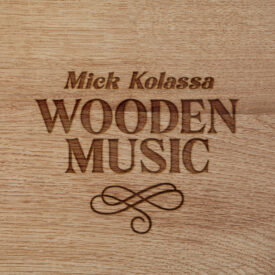 The title of this one made me wonder a little bit, but here’s a release that will just knock you out. Long-time Bluesman Mick Kolassa has been putting out recordings for about ten years, but his latest “Wooden Music”, which was just released a couple weeks ago, hits home with nary an electric guitar involved. It’s not the first all acoustic album he’s done, and hopefully there’s more to come. “Michississippi Mick” earned his moniker as though he now lives in Memphis, he was born in Michigan, and also lived in Mississippi for three decades. No acoustic instruments were harmed in the making of this CD! Mick has assembled a familiar crew of musicians to help out, plus a couple curve balls to keep you on the edge. Out of 11 tunes, only one is a cover, so stand up, sit down, or get in your car and enjoy it. First up is “Educated By The Blues,” about a guy who was expected to go to college, since he was told it’s the only way to get ahead in life. But nothing taught him like that sweet “devil sound,” and he’s learning new things every day!
The title of this one made me wonder a little bit, but here’s a release that will just knock you out. Long-time Bluesman Mick Kolassa has been putting out recordings for about ten years, but his latest “Wooden Music”, which was just released a couple weeks ago, hits home with nary an electric guitar involved. It’s not the first all acoustic album he’s done, and hopefully there’s more to come. “Michississippi Mick” earned his moniker as though he now lives in Memphis, he was born in Michigan, and also lived in Mississippi for three decades. No acoustic instruments were harmed in the making of this CD! Mick has assembled a familiar crew of musicians to help out, plus a couple curve balls to keep you on the edge. Out of 11 tunes, only one is a cover, so stand up, sit down, or get in your car and enjoy it. First up is “Educated By The Blues,” about a guy who was expected to go to college, since he was told it’s the only way to get ahead in life. But nothing taught him like that sweet “devil sound,” and he’s learning new things every day!
Producer/guitarist Jeff Jensen plus Rick Steff on piano make this a fun shuffle. Guest stars here are Doug McLeod on slide, and Beale Street star Vince Johnson on the harp. Mick name drops that Wolf “taught him to howl,” but also mentions Sonny Boy, Jr. Kimbrough, Muddy, and Robert Johnson. That’s enough to grab your interest. Some real low down guitars adorn “You Gotta Pay The Price.” This is a tune about working men and women like you and me. More of Doug McLeod, and Rick, who doubles on accordion, laying it down in the background. Two songs in, and I’m hooked on this “Wooden Music ”
BMM was honored to speak with Mick by phone, and, while abbreviated due to space constrictions, here it is. As usual, I love it, you’ll love it, but what does Mick think of it?
“I’m especially proud of this one for s number of reasons. In putting it together, we wanted people to know that a totally acoustic album can still have have a full sound. You think “acoustic album,” and in between you and me, most folks think just an old white guy playing a Resonator guitar, right? I’ve done 3) other acoustic albums, and we wanted to show how full and rich this music can be. There were some really fun challenges with this one. On the song “Hurt People, I’d put a B3 on it in a minute, but have yet to find an acoustic B3. That’s why we brought in Reba Russell and Susan Marshall to do the “oohhss” and aaahhss” to cover that sound. “
Next one you’ll like is “Sugar In Your Grits,” which Mick starts off “Traditions get trampled when new folks come around, they might not know where something fits, maybe it’s progress, or maybe it’s wrong, to put sugar in your grits.” (Mick informed me that’s a common mistake made by visiting Northerners). The secret weapon on this one is Bob Corritore on the Harp, who has over two dozen of his own releases, and upwards of a hundred appearances on recordings by other blues performers. When artists ask you to play with them that many times, you, the listener can’t go wrong! More of Mick’s poetry. “Muddy never played a 20 minute solo, Wolf didn’t use a pedal board, Willie Dixon told a story with everyone of his songs, do lyrics even matter any more?” The excellent section of Carl Casperson on upright bass and drummer Tom Lonardo got the backing through this one and also every other cut.
“Hurt People” starts off as more traditional acoustic blues, a story about a gal who was sad, lonely, and had no love, as all she’d ever learned to do was hate. Rick is at his best on the 88’s, while the Memphis legends mentioned earlier, Susan Marshall and Reba Russell provide soulful, mournful backing vocals. Mick and Jeff continue to lay down the wooden guitars. The lyrics teach a lesson learned, and this song is good stuff. Slowing it down, just a little, is “Memphis Wood.” Great guitars (again), and more of Rick’s accordion. Maybe my favorite track? Why? Because I know we have some Tas Cru fans out there, and he’s worked with Mick many times before, here adding his guitar to a song about guitars made out of wood, and from where else? Memphis! Very cool tune. I asked Mick to talk about it.
“You can tell from this one that I’m really fond of the sound of an acoustic guitar. I started playing around with that term, and the Ist line is the Ist phrase from “Norwegian Wood ” I didn’t pattern this one after the Beatles, but it starts, “I once had a girl, or should I say, she once had me.” During the last IBC here in Memphis, Tas showed up and was going to stay with me for a few days. I played him a rough demo, and he reached over for my guitar, and started playing this beautiful solo. I said “You are now going to be on the record! To have someone like Tas, who just loves music…a lot of musicians, it’s their job, but I’m so thankful to play with people like him. This is my love song to acoustic guitars.”
Just the basic band on “If Life Was Fair,” which includes some nice honky-tonk blues piano from Rick. This would be a great one to see live. It ’11 make you feel like you’re sitting in some side street blues dive with your friends, on a rainy night, enjoying the music and a few Old Style’s. “Over My Shoulder” is upbeat, “I can’t live in the yesterday with tomorrow just waiting for me. You can spend your time looking at the past, complaining it’s not here no more.” A real forward looking kind of guy. The acoustic guitars sound damn near electric, and more terrific input from the core band. Really nice groove that compliments the words.
On the press release, Mick mentioned he wanted to really craft the songs, and not just play them. I asked him to expand on that.
“By putting a a limit on myself, like only acoustic, you have to be more creative. Jeff and I spent hours and hours finding the right instruments, going through the songs, and deciding what keys, what sound, and what tempo I wanted on each cut. I wanted every tune to sound as big as it could be. There’s more drums on this one from Tom Lonardo. Tom was with me on my last release, but he was restrained. This time, we just let him play. Like the song “If I Told You, ” it opens with his drums, which you’re not expecting. The sheer pleasure of sharing Vince Johnson on harmonica. He’s a national treasure, and plays 5 nights a week on Beale Street. I’m lucky to have friends like this. I want to be true to the blues, and not what older white guys want it to be.”
The guitar chords leading in to “One Hit Wonder are then joined by the whole cookin’ band is really good stuff.
And the lyrics are worth the price of admission alone. I’II leave this one for you to check out on your own, and you’ll love it. I’m purely guessing, of course, that there’s a number of BMM readers (and maybe a couple writers) who are
“One Hit Wonders” in their own right. Check it out! To finish up is the country/blues infused southern “Michissippi style fun of “Gas Station Sushi.” “Girl you remind me of gas station sushi, you sure seemed like a good idea at the time, but it didn’t take me long to find out I was wrong.” Any of you remember being in elementary school during the mid 1960’s? The instrument that any of us could play instantly? Well, just for you, on this final cut, Mick whips out the Kazoo! What a great end to this excellent disc.
I asked Mick what is next for him?
“I’ll be playing in Three Rivers, Michigan on August 6th, the Sean Costello fundraiser in Peoria the night before the Blues Blast Awards (Sept. 22), and the Oxford, Miss. Blues Fest (Oct. 14th). I did a show here with Doug MacLeod and Jeff Jensen in June called “Blues Free For All.” We’d like to do those quarterly in Memphis, and add some other artists. I also put out 3) CD’s last year, which is great except when it’s “Hey Mick! Let’s talk about your new album” and I’m like “Great! Which one?” I also want to get back playing live in Europe, which I miss, and at some point, start on the next album, which will be my 15th.
For being a real-deal bluesman, Mick has quite the background, including a Ph. D in Pharmaceutical Marketing from Ole Miss University, is the former CEO of Medical Marketing Economics, and also authored a book titled “The Strategic Pricing Of Pharmaceuticals.” But that’s maybe for another time. His albums are a true labor of love, as 100% of the net proceeds from all his releases go to the Blues Foundation, split between the HART Fund and Generation Blues, both very worthy causes. The way Mick has put these songs together, along with Jeff’s production, have come together to form a huge sound. It’s full, certainly not skinny, and it’s hard to believe that there were no electric instruments used at all, because on many cuts, you’d swear there were. And a bunch of friends adding in their musicianship, so precise and skilled, you’d think they’ve been playing together for years. Make no mistake “Wooden Music’? Yes… and the Blues? Hell, yes. Highly recommended that you get this one.
MORE >>
